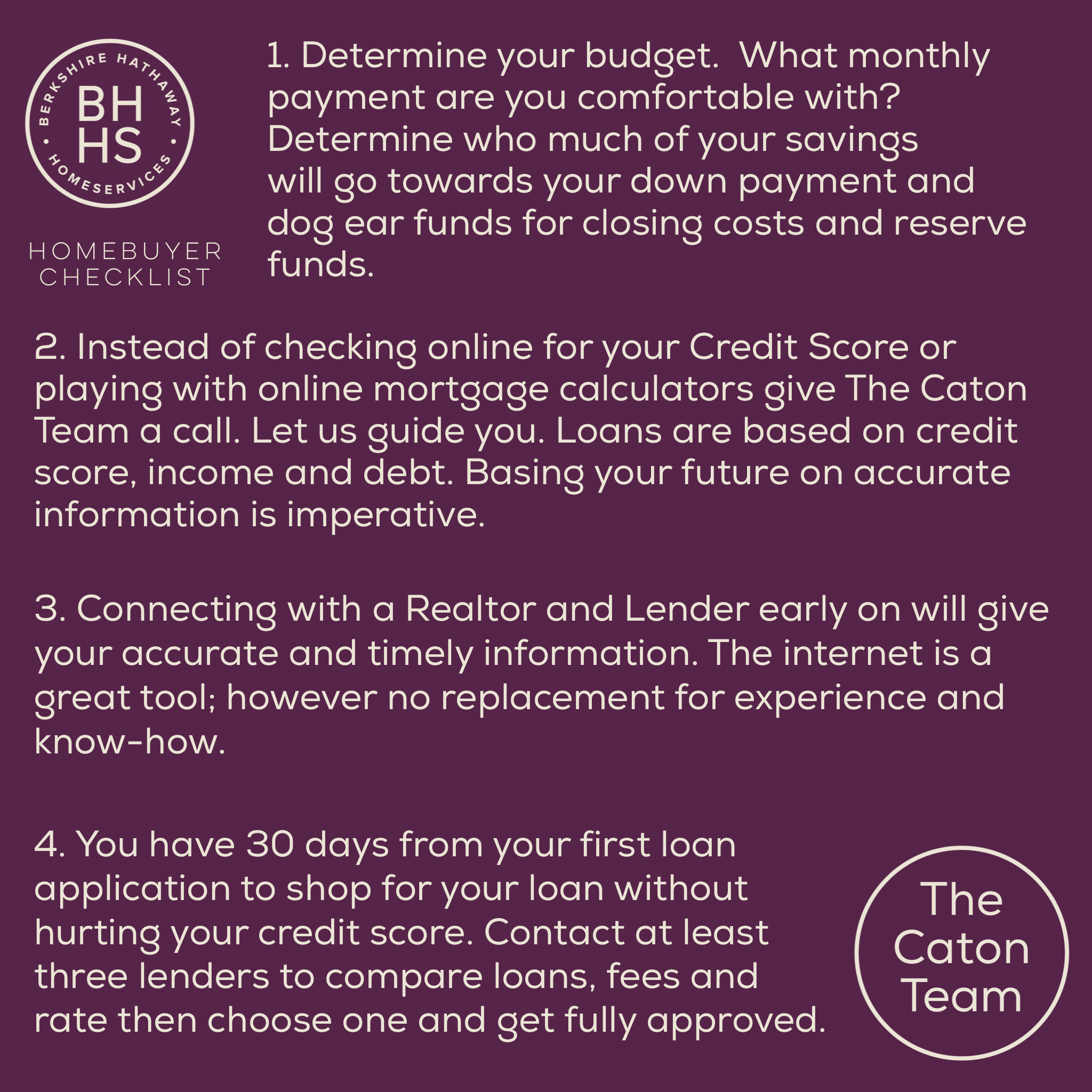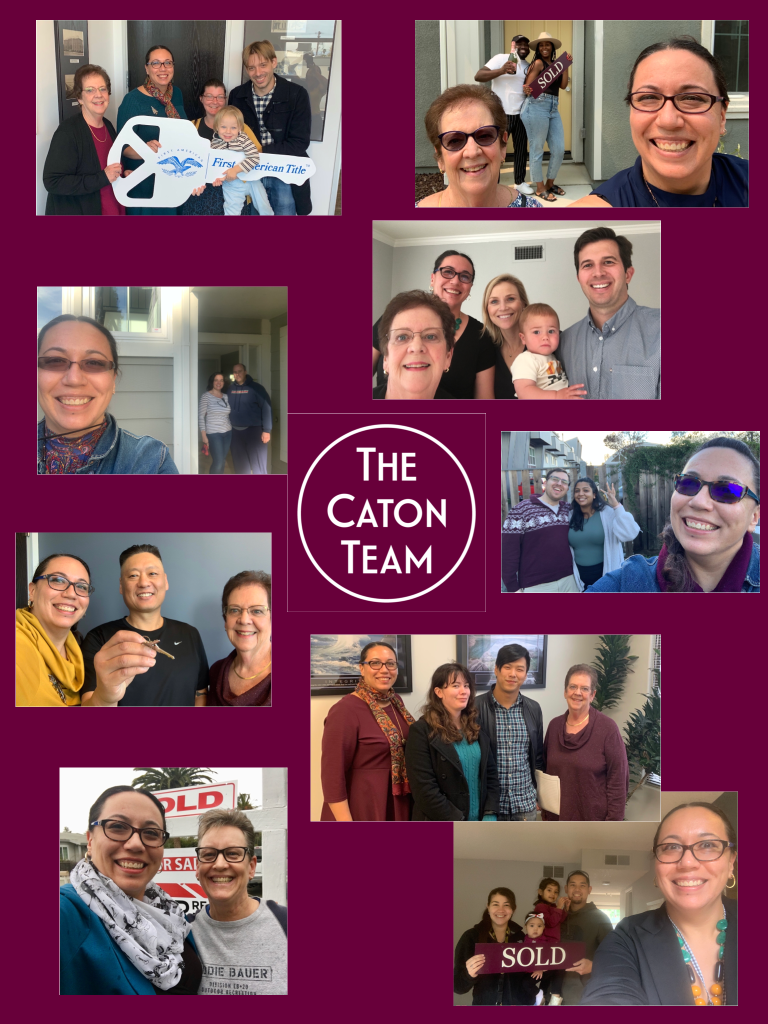Things to consider when purchasing Real Estate
Buyer Tips | The Importance of Lenders | Managing Your Credit | Why Work with Us
If you are thinking of buying a home, get ready for a journey. There are many steps involved with finding a house, getting an offer accepted and then actually closing the escrow and getting the home – that it can be daunting! I try to map out the journey when we first meet – but that is a lot to take in. Below is an overview of the steps involved with going from looker to homeowner. If you have any questions, we are always here to help.
Call | Text | Sabrina 650.799.4333 | Susan 650.796.0654 | EMAIL | WEB | BLOG






STEPS TO BUYING A HOME – by THE CATON TEAM
1. Our Initial Interview
Before we meet, you should determine your needs, wants and desires for your new home. When we meet, we will discuss your parameters and expectations. If you are already pre-approved for a home loan – we will discuss how your wants and needs list relates to homes in the area in your price range. If you are not approved for a home loan – that will be the first item on your to-do list before we look at properties.
2. Get Pre-Approved for your Home Loan
Contact your Financial Institution (Bank, Credit Union, etc) to apply for a home loan. Provide them with all the necessary information (income verification, taxes, debt) to be approved – not pre-qualified. Once the bank has reviewed your finances they will provide you with a Pre-Approval Letter outlining the loan they have agreed to extend to you – this letter will outline your purchase power and your down payment. Without this letter we cannot write any offers. This is a critical step towards homeownership.
Once you know your purchase power we can help you shop your loan if necessary to find the best loan, interest rate & terms. At this time we also want to determine what your maximum comfort level is and your budget. And going forward, we expect our clients to “live” their mortgage. That means going forward the difference between your rent and your mortgage should be put into a savings account so you can determine if the mortgage is within your comfort level.
3. Property Tours
Once you’ve hired the Caton Team and you are pre-approved for a home loan – now the fun begins. We will start showing you the homes we’ve previewed on your behalf. We listen carefully to fine-tune your ideal home and provide market information so you can determine your course. We provide comparable property analysis in order to assist you with your decision.
4. Write an Offer
Congrats – you found a house you want to write an offer on! When possible – we get the Sellers Disclosure package beforehand so you can review the disclosures before we write an offer. There is a lot of reading to do at this time and it is important that you make time to read the disclosures. For the first offer we write – I prefer we sit down face to face to review the disclosures, comparable market analysis and discuss – well the biggest purchase of your life – in person. Writing an offer will take between 2 to 4 hours. We complete the purchase agreement contract & review all the necessary disclosures with you. When you write an offer, a 3% good faith deposit is required and a check will suffice. So don’t forget your checkbook! (And make sure the funds are available should your offer be accepted!)
5. The Caton Team Presents Your Offer
We prepare a presentation on your behalf, highlighting the strengths of the offer & your strengths as the buyer. We present your offer to Sellers & the Sellers’ Realtor whenever possible. The seller has three options in response to your offer. They can either accept your offer, counter it, or reject it. The Caton Team strives to have your offer accepted on the first try and we do some investigating on your behalf to determine what terms would please the seller and work for you.
6. Rejected Offers
Often times, especially here on the peninsula, buyers find themselves in multiple offer situations and are up against several buyers for one house. This is stressful for each buyer. The Caton Team has over 25 years of combined local Real Estate experience that we put to use when helping you write your offer. However, in this competitive market, sometimes a better offer is on the table and other offers are simply rejected. It’s always best to put your best foot forward and write your best offer incase you do not get the chance to review a counter offer.
7. Counter-Offer
If a counter offer is received, The Caton Team will discuss the counter-offer with you and how it relates to your goals and prepare a response with you. We negotiate the counter-offer in your best interest while keeping in mind the sellers needs. It is a delicate process we are more than prepared to do.
8. Escrow
When your offer has been accepted and signed by all parties, escrow is opened and the good faith deposit (earnest money) will be deposited with the escrow company and your check will be cashed. The Escrow Officer will order the Preliminary Title Report & send copies to the Lender & us. Congratulations – you are in contract and soon we’ll be handing you the keys – however there are still some very critical steps to accomplish before we are through.
9. Contingency Period
The day after acceptance of your offer – counts as day 1 in the contract. Most contracts have contingency periods to have your loan and appraisal completed and within this same period the buyer must conduct any and all inspections. At this time, the buyer must finish reviewing old and new disclosures and approve them. Once you have read and approve the findings to your satisfaction and have preformed any and all inspections you deem necessary and are satisfied with the property – you – the buyer will remove the contingencies in writing. At this point, you are locked into the contact. If a situation arises and new information is discovered regarding the value and desirability of the property – we will discuss how to proceed. Most of the time, at the end of the contingencies period – you have thoroughly investigated the property to your satisfaction and are prepare to move forward.
10. Homeowners’ Insurance Coverage
During the contingency period the buyer will need to obtain
Homeowners’ Insurance Coverage. Select an insurance company and discuss coverage (it is best to start with your car insurance company – they often offer umbrella discounts). Once you’ve found your home owners insurance, let us know – we will want to get that info to the escrow company to close escrow in time. If you are purchasing a condo, the Home Owners Association covers this step. If you are purchasing a single-family home, homeowners insurance is critical and your lender will require a policy in place at close of escrow.
11. Signing Documents at the Title Company
Once your appraisal has come in satisfactory and you’ve provided your lender with all the last minute documents. The lender will send the loan documents directly to the title company several days before close of escrow. Most banks will also send the buyer copies of these documents and it is best to take time to review your loan documents prior to our signing appointment to make sure all the terms and conditions are what you agreed too are in writing. If changes need to be made to the loan documents – only the lender can make those changes and documents will have to be redrawn, which could cause delays. Be sure to review all documents in advance. Time is of the essence in real estate. We will meet you at the title company to sign your loan docs with you. Don’t forget your photo identification
– and make sure it is current!
12. Down Payment and Closing Fund
The Escrow Officer will provide the buyer with an Estimated Closing Statement, which will itemize costs and credits, estimating the total money due at closing and also provide wiring instructions if you are doing a wire transfer of your down payment. You may bring a cashier’s check to the Title Company several days prior to closing instead of wiring the funds.
13. Funding
Lenders will send funds directly to escrow the day before closing.
14. Close of Escrow
This is the big day! Once your funds and the banks loan are in escrow, the Title Company will record the deed at the County Recorder’s office. Once ‘we are on record” I, as your Realtor, can get the keys from the seller and hand them over to you! All that hard work and running around pays off the second we hand you the keys.
15. Move In!
The last step – time for you to move into your new place! Congratulations!


DETERMINING YOUR BUDGET
When considering the purchase of a home many factors come into play. Budget, Goals, Needs and Wants are all key players when deciding your next step. Here are a few things to remember and consider:
1) Determine your Budget. Lenders will allow up to 30% of your monthly income to go to all debt. That includes your car loan, student loans, credit card debt and the mortgage.
2) When talking about your monthly mortgage payment – we uses the term PITI:
PRINCIPLE: How much of your monthly payment that goes towards your loan principle
INTEREST: How much of your monthly payment goes towards your interest rate
TAXES: Property Tax is 1.25% of your purchase price (and rises yearly), we divided it by 12 and add it to the monthly cost of homeownership. (It is actually paid in two installments, Feb & Nov)
INSURANCE: A home or condo needs homeowners insurance, we estimate the yearly premium and add the monthly cost to the total.
This gives the borrower and accurate picture of the monthly cost of the home, even though many of the payments are annual or semi-annual.
3) Down Payment. These days a borrower needs a minimum of 3.5% for their down payment to qualify for an FHA loan. FHA loans do have strings attached and Private Mortgage Insurance is an expensive cost of putting less than 20% down. It’s best to sit down with a lender to discuss your loan options. We have several trusted lenders you can work with.
4) Closing Costs: Many borrowers expect the need for a down payment but do not understand what “closing costs” are. Closing Costs are the fees associated with purchasing a home. Closing costs run about 3-4% of your purchase price and must be liquid and available. Closing Cost Fee’s included:
Lender Fees: Costs for your loan, including but not limited to, appraisal fees, credit report fee, points (1% of loan amount to pay down your interest rate up front), doc prep, underwriting, administration fees, and wire transfers to name a few.
Title & Escrow Fees: When purchasing property you will also purchase two Title Insurance Policies to ensure the property is yours and no one can stake a claim to your property. The Title & Escrow companies also charges Escrow Fees for handing the monies, loan docs, and recording the property with the county.
Inspections Fees: There are also fees that are paid outside of escrow, such as Inspections on the property that are often given a discount if paid at time of the inspection.
5) Gift Funds. When a borrower is receiving monies for the home as a gift, the lender will require a paper trail, including a Gift Letter signed by the person giving the gift expressing the money is not a loan and will not expect the money to be paid back. Also, it is best to get that Gift Money upfront to “season” the money in the borrowers bank account. Banks like to see 3-6 months of “seasoning”.



Got Questions? The Caton Team is here to help.
Call | Text | Sabrina 650.799.4333 | EMAIL | WEB | BLOG
We love what we do and would love to help you navigate your sale or purchase of Residential Real Estate. Please reach out for a personal consultation. Please enjoy our free resources below and get to know our team from our TESTIMONIALS.
| HOW TO SELL | GET READY CAPITAL – Loans to Prep for Sale | VIRTUAL STAGING | A GUIDE TO BUYING | BUYING INFO | MOVING | TESTIMONIALS |
Effective. Efficient. Responsive. The Caton Team 🏡 How can The Caton Team help You?
Call | Text | Sabrina 650.799.4333 | Susan 650.796.0654 | EMAIL | WEB | BLOG



Get exclusive inside access when you follow us on Facebook & Instagram
| HOW TO SELL | GET READY CAPITAL – Loans to Prep for Sale | VIRTUAL STAGING | A GUIDE TO BUYING | BUYING INFO | MOVING | TESTIMONIALS |
Got Real Estate Questions? The Caton Team is here to help.
We strive to be more than just Realtors – we are also your home resource. If you have any real estate questions, concerns, need a referral, or some guidance – we are here for you. Contact us at your convenience – we are but a call, text or click away!
The Caton Team believes, in order to be successful in the San Fransisco | Peninsula | Bay Area | Silicon Valley Real Estate Market we have to think and act differently. We do this by positioning our clients in the strongest light, representing them with the utmost integrity, while strategically maneuvering through negotiations and contracts. Together we make dreams come true.
A mother and daughter-in-law team with over 35 years of combined, local Real Estate experience and knowledge – wouldn’t you like The Caton Team to represent you? Let us know how we can be of service. Contact us any time.
Call | Text | Sabrina 650.799.4333 | Susan 650.796.0654 |EMAIL | WEB| BLOG
The Caton Team – Susan & Sabrina
A Family of Realtors
Effective. Efficient. Responsive.
What can we do for you?
The Caton Team Testimonials | Blog – The Real Estate Beat | TheCatonTeam.com | Facebook | Instagram | HomeSnap | Pinterest | LinkedIn Sabrina
Berkshire Hathaway HomeServices – Drysdale Properties
DRE # |Sabrina 01413526 | Susan 01238225 | Team 70000218 |Office 01499008
The Caton Team does not receive compensation for any posts. Information is deemed reliable but not guaranteed. Third-party information not verified.





206 thoughts on “Buying with The Caton Team”